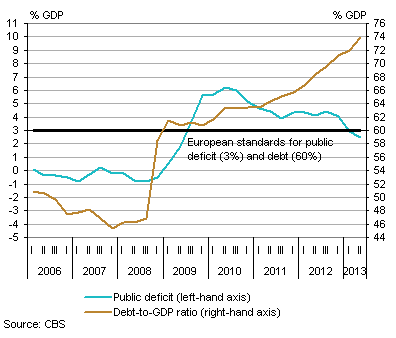Public deficit to 2.5 percent

With 2.5 percent of GDP, the public deficit over the period July 2012-June 2013 was far below the EU ceiling of 3 percent. The deficit over the entire year 2012 was 4.1 percent of GDP.
Lower deficit over first six month
The public deficit over the first six months of 2013 was 2.5 billion euros. In the first quarter, there was a surplus of 4.5 billion euros, largely due to the one-off receipts from the auction of telecom frequencies. In the second quarter, government expenditure exceeded revenue by 7 billion euros, mainly social fund expenditure. In the first as well as in the second quarter of 2013, the government deficit was smaller than in the corresponding quarters of the past four years.
Government surplus/deficit per quarter

Government spending stalls, government revenues growing
Government revenues continued to grow. Social insurance contributions rose rapidly and revenues from natural gas consumption and dividends also increased substantially.
Government spending has stalled since 2010. The government cut back drastically on wage costs and the purchase of goods and services. Over the past six months, government spending was reduced by more than 1.5 billion euros relative to the same period in 2012. The government also introduced serious subsidy cuts. Unemployment and AOW (Old Age Pension Act) benefits and benefits paid under the Health Care Insurance Act grew by 2.6 billion euros.
Public revenue and expenditure on an annual basis

Public debt runs up to 73.9 percent
At the end of the second quarter, the public debt of the Netherlands stood at 442 billion euros, i.e. 73.9 percent of GDP and above the European limit of 60 percent of GDP. Over the past six months, public debt has risen by 15 billion euros. The deficit accounted for 2.5 billion euros, the increase in financial assets, e.g. deposits, outstanding loans and profit shares accounted for nearly 13 billion euros. Profit shares increased because the Netherlands made an extra contribution to the European Stability Mechanism (ESM) and the European Investment Bank (EIB).
Public deficit and public debt on an annual basis

Léonard Haakman